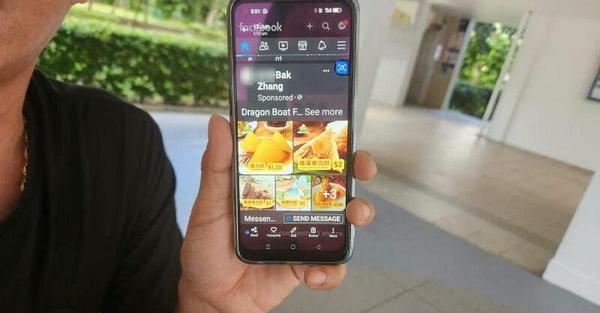Follow us on Telegram for the latest updates: https://t.me/mothershipsg
Hoping to capitalise on a S$2 deal for glutinous rice dumplings, a man downloaded and used a payment app on the instructions of the seller, only to realise the next day that S$6,000 had been transferred out of his bank account.
The victim, Lin, 43, told Shin Min Daily News (Shin Min) that on June 12, he noticed a Facebook advertisement promoting glutinous rice dumplings for S$2 each.
Lin proceeded to message the seller directly on Facebook, indicating that he wanted to purchase 15 dumplings.
Was instructed over WhatsApp to download payment app
After that, Lin told Shin Min that the seller shifted the conversation to WhatsApp, citing that it would be more convenient.
Lin subsequently received a payment link from the seller, which he was instructed to click on.
He complied with this, and it led to an app being downloaded on his phone.
Lin then followed the other party's step-by-step instructions to create an account and password before placing his order via the app.
The app also indicated that Lin would receive a S$10 discount for the order, and that payment would be made upon delivery.
Did not key in bank account details
The last step, the seller told him, was to key in his bank account details.
However, at this point, Lin began to feel uneasy, and voiced his concerns about keying in such sensitive personal information.
Instead of pressing the issue, the seller convinced Lin to key in his home address and contact details, on the pretext of completing the order.
WhatsApp number changed, lost S$6,000 from bank account
According to Shin Min, Lin found out the next day (June 13) that the number linked to his WhatsApp account had been changed.
He realised this when his colleague dropped him a WhatsApp call, but his phone never rang.
Following which, he called his colleague using his phone, but a different number was reflected on his colleague's phone, sporting the same WhatsApp profile picture.
Later that day, Lin was informed by his bank that about S$6,000 had been transferred out of his bank account that morning.
Lin also made an enquiry with the bank as he was unable to access his iBanking account.
That's when he discovered that someone had tried to login to his account multiple times to no avail, resulting in his account being locked temporarily.
Realising that he had fallen victim to a scam, Lin immediately lodged a police report.
Scammers may have remotely controlled his phone
Lin admitted to Shin Min that he was confused about how his account could have been hacked, as he did not provide the scammers his banking details.
"I didn't key in any of my banking details into the app I downloaded. What's more, I don't save any of my passwords on my phone, but always input them manually. I don't understand how they could have possibly hacked into my account," he elaborated.
Lin did recall, however, that after downloading the app, a blue sign appeared at the corner of his phone screen.
He later learned that one's phone can become vulnerable to scammers upon downloading of malicious applications, and scammers can remotely control his phone or copy information stored on it.
With police assistance, Lin successfully deleted the said app from his phone, and regained the use of his original WhatsApp number.
In response to Mothership's queries, the police confirmed that a report was lodged and investigations are ongoing.
Top image from Shin Min Daily News on Facebook.
If you like what you read, follow us on Facebook, Instagram, Twitter and Telegram to get the latest updates.

